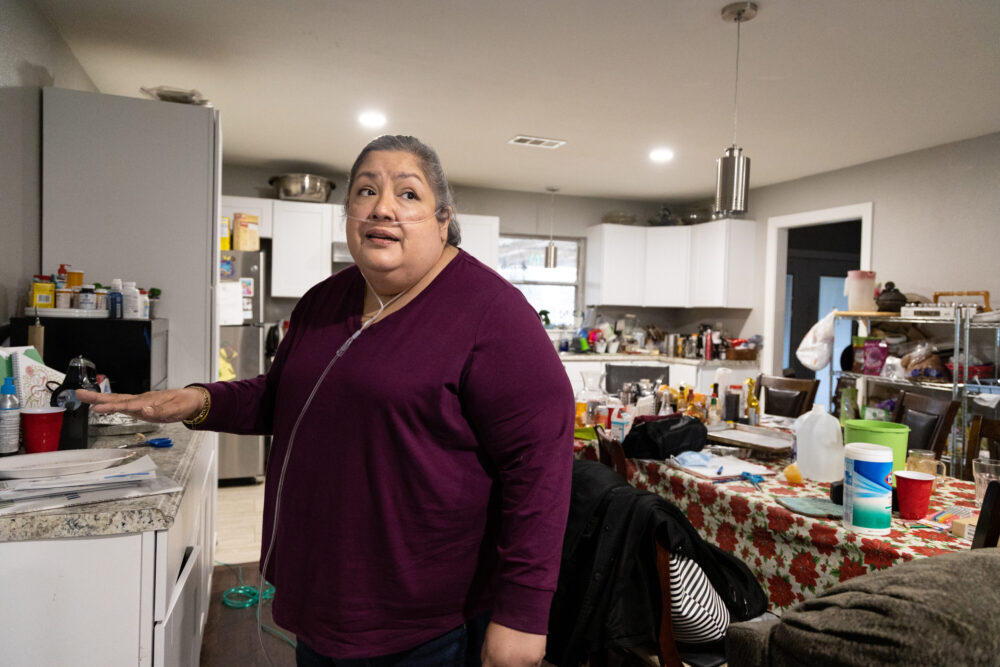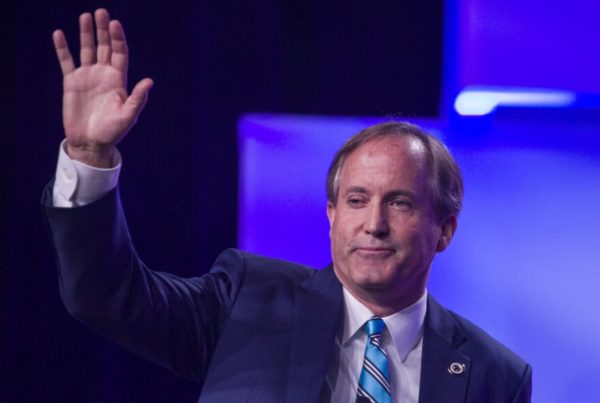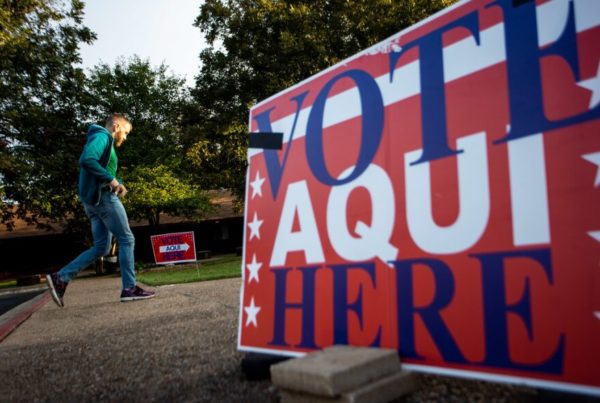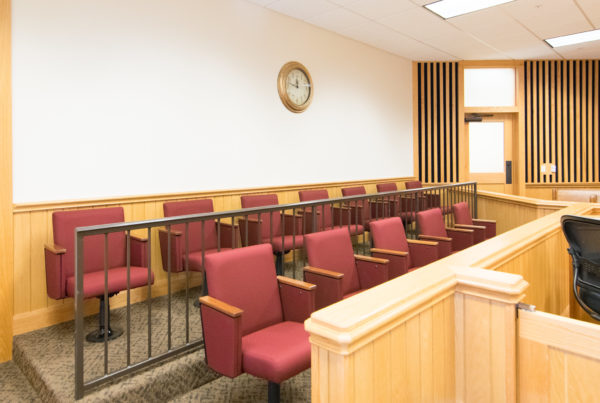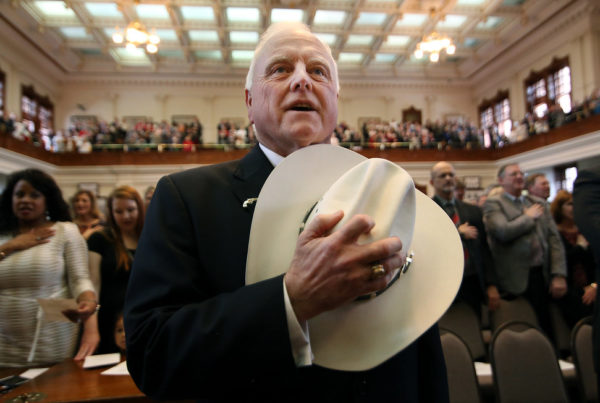When early voting in the Texas primaries kicks off Monday, voters will have a chance to cast their ballots for commissioner of the Texas General Land Office (GLO). The primary is an open contest, with current commissioner George P. Bush running for the Republican nomination for attorney general.
The land commissioner’s post is the oldest office in the state, predating that of governor. But few Texans understand its responsibilities. Few that is, except for the ones most impacted by what the office does.
Alice Torres has lived in her brick bungalow in Southeast Houston for more than 30 years, for much of that time sharing the house with her mother, Dolores. In 2017, Harvey flooded the house to a depth of three feet.
“We had insurance,” Torres said, “but we ran into problems with the insurance company, and they didn’t give us enough to fix the house. Then we had to seek help.”
Torres got some help with repairs from the nonprofit Baker Ripley, but getting help from the city of Houston was a bureaucratic nightmare that stretched on for years.
“We were this close,” she said, “this close to finally getting everything done so it could start work, so the city could start work on finishing the house, when (the) GLO took over the program.”
The GLO took responsibility for Houston’s Harvey recovery funds in late 2020, but Torres said not much has happened since then.
“We haven’t gotten anything done, and that was over a year ago,” she said.

Alice Torres points toward a damaged window in her home on Feb. 4, 2022.
Torres’s case is far from unique. She and several of her fellow community members have formed an organization called the Harvey Forgotten Survivors Caucus. Julia Orduña, Southeast Texas regional director for the nonprofit Texas Housers, has been working with the caucus to try to get the GLO to expedite its aid.
“Unfortunately, the leadership has not paid attention to the caucus,” Orduña said. “The caucus has actually written a couple of open letters to George P. Bush to be able to ask for a meeting with him and be able to understand what the GLO is going through and how they as survivors, as community members, and as advocates themselves can actually help the GLO better their process, and unfortunately, we haven’t heard anything from George P. Bush himself.”
Disaster recovery only became a GLO responsibility after Hurricane Ike in 2008. Former Land Commissioner Jerry Patterson said before that it was the job of two other agencies.
“I got a call from Governor Perry saying, ‘Hey, we want you to take this over. Can you do it?’ And I said, ‘Yes, sir. Yes, sir,'” Patterson said. “And then we took it over and we created what I believe was a very functional, very efficient operation.”
Patterson has been out of office since 2015. The program has evolved since then, and many Houston and Harris County residents would not characterize it as functional and efficient now.
Last year, the GLO set off a firestorm of protest when it initially awarded the city and county zero dollars for federal Harvey relief. The agency later walked back that denial, but the city and county are still pressing for more than the office has been willing to give.
The main historical charge of the GLO, as the agency’s name indicates, is managing some 13 million acres of state lands, most of them offshore, with the aim of making sure oil and gas revenues get the best return. Those revenues are used for the Texas Permanent School Fund, which underwrites bonds for K-12 education.
“What that translates into is, every citizen of Texas who pays school taxes would be paying more if not for that fund,” Patterson said.
The land commissioner has also been responsible for veterans’ issues since just after World War II, with the creation of the Texas Veterans Land Board.
“It was for the purpose of providing low-interest loans to returning veterans to purchase land,” Patterson said.
Patterson said it has since evolved to include both land and home improvement loans as well as managing state veterans homes and cemeteries.
Beyond that, the office has major responsibilities for environmental protection and conservation. Also under Patterson’s tenure, the land commissioner took over the management of the Alamo. That has proven a source of controversy ever since, with fights developing over George P. Bush’s redesign plan, including an ultimately unsuccessful proposal to move the Cenotaph.
Patterson held the office for 12 years, and even he describes the post as obscure to most Texans.
“I remember when I was campaigning for land commissioner, I’d go somewhere in Texas, and I’d say, ‘I really appreciate your vote for commissioner of the Texas General Land Office’ and the guy would say, ‘Well, I can’t vote for you, I’m in Precinct 3,’” Patterson said.
Yet all told, 12 candidates are running in the primary for Land Commissioner, eight Republicans and four Democrats. Ann Bowman, a professor at the Bush School of Government and Public Service at Texas A&M University, said past land commissioners have gone on to hold other elected positions, such as David Dewhurst who went on to serve as lieutenant governor.
“It’s usually a pretty good jumping off point for running for subsequent office, like we’re seeing George P. Bush do running for attorney general,” Bowman said.

Texas Land Commissioner George P. Bush speaks at a kick-off rally where he announced he will run for Texas Attorney General, Wednesday, June 2, 2021, in Austin, Texas.
Eric Gay / AP Photo
The best-known, and best-financed, Republican candidate to succeed Bush is State Senator Dawn Buckingham. According to her latest campaign finance report, Buckingham currently has more than $1.8 million in the bank.
“When I looked at what the left was trying to do to our history and to oil and gas, I really felt like Texas needed a proven conservative to jump in there and defend the Texas we know and love for future generations,” Buckingham told conservative talk show host Chad Hasty when she appeared on his show last October.
Buckingham, like most of the Republican field, has stressed her conservative bona fides on issues that have little or nothing to do with the responsibilities of land commissioner. Her campaign website, for example, touts her positions as an opponent of abortion and a supporter of the state’s strict new election laws.
But she’s also promoting her hardline positions on border security and immigration, and those do fall within the purview of the land commissioner, albeit as recent additions.
“The first section of the border wall was made through the General Land Office on Texas lands because there were submerged lands and to help control flooding down in the valley,” Buckingham said. “And, of course, you know the state has lots of acres that are on the border, so you know as a dedicated fighter for border security so that we can have a sovereign nation, we’ll be fighting on every front we possibly can in this office.”
Buckingham’s rivals for the Republican nomination include surgeon and attorney Jon Spiers, attorney Rufus Lopez, former district court judge Don W. Minton, businessman Ben Armenta, former Texas Real Estate Commissioner Weston Martinez, former congressional candidate Tim Westley, and retired ICE special agent Victor Avila.
On the Democratic side, the leading candidate is conservationist and King Ranch scion Jay Kleberg, who previously ran for state representative from El Paso as a Republican.
Kleberg currently has a campaign war chest of just under $370,000. In his online ad, he staked out his position as someone determined to protect the state against natural disasters.
“I’m about to say something so simple. Why it’s considered daring in Texas politics, I have no idea: I believe in climate change,” Kleberg said in his video ad. “I grew up in agricultural community in South Texas, so I’ll tell it to you straight. Our weather is changing. It’s a fact of science. Whether our politics changes and we start demanding more, well, that’s up to us.”
Kleberg’s opponents for the Democratic nomination include mental health policy advocate Sandragrace Martinez, investment manager Michael Lange, and community organizer Jinny Suh.
Because the office of land commissioner is so low profile, the turnout for the primaries is typically low — less than 20% overall, according to Texas A&M’s Ann Bowman.
“One would think the greater the number of candidates, the more likely you are to have a runoff. Nobody is going to be able to get that magic 50% plus one,” she said.
All that means a relatively small number of voters could help determine the outcome of the primaries.
“When you think about the breadth of the responsibilities for this position, I do think — and I understand that there are high profile races for governor and attorney general and the like — but I do think that this is a position that is of particular import to the everyday lives of Texans and something to focus on this election year,” said Tim Mulvaney, a professor at Texas A&M University’s school of law.
That’s certainly true for southeast Houston resident Alice Torres. She worries that whoever succeeds George P. Bush could set her recovery efforts back to the beginning. Since her Harvey recovery process started, she’s lost her mother to COVID, and she’s now battling a chronic autoimmune disorder. She has little patience for candidates who might be looking for a stepping stone to higher office.
“Know who you’re voting for. Because these people, they’re the ones who are entrusted with the keys to the house, literally,” Torres said. “Make sure that they have experience for the position they’re running for. Make sure you get to talk to them and question them and say, ‘Hey are you going to be there for me when I need you? When I call, are you going to answer the phone?’ Because I haven’t heard anything from George P. Bush.”


